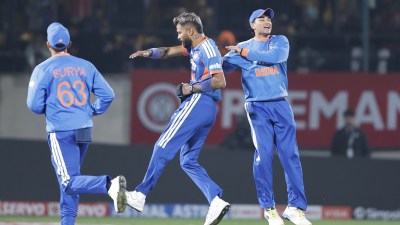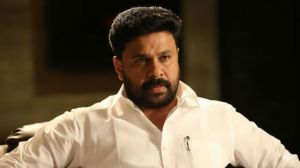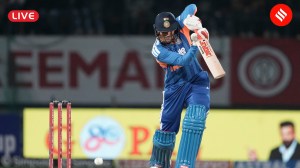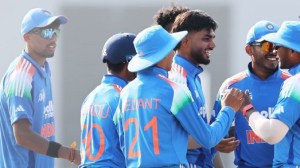Mahua Moitra case: Echoes of cash-for-query from 18 years ago, leading to quick expulsion of 11 MPs
Of the 11 MPs first named in a sting operation, and later held guilty by a parliamentary committee, 6 belonged to the BJP; A trial began in 2017
 MP Nishikant Dubey accuses Mahua Moitra of taking “bribes” from businessman Darshan Hiranandani to ask questions against the Adani conglomerate, in return for "favours".(File)
MP Nishikant Dubey accuses Mahua Moitra of taking “bribes” from businessman Darshan Hiranandani to ask questions against the Adani conglomerate, in return for "favours".(File) Accusing her of accepting money to ask questions in Parliament, BJP Lok Sabha MP Nishikant Dubey has hauled Trinamool Congress (TMC) parliamentarian Mahua Moitra before the House Ethics Committee, and now approached the Lokpal. Dubey accuses Moitra of taking “bribes” from businessman Darshan Hiranandani to ask questions against the Adani conglomerate, in return for “favours”.
The Ethics Committee which was looking into the case is learnt to have recommended her expulsion from the 17th Lok Sabha in its draft report. The panel is set to meet on Thursday (November 9) to adopt the report and send it to the Lok Sabha Speaker.
In a letter to Speaker Om Birla seeking a probe, Dubey had said the case was reminiscent of the 2005 cash-for-questions scam.
That scam, 18 years ago
One year into the first term of the UPA government led by Manmohan Singh, digital portal Cobrapost unveiled a sting operation — titled Operation Duryodhana — netting MPs who allegedly showed willingness to promote a company and ask questions in the House in exchange for money.
Cobrapost claimed the investigation was spread over eight months, and involved 56 video and 70 audiotapes and 900 phone calls. It said its journalists Aniruddha Bahal and Suhasini Raj had posed as representatives of a “fictitious lobbying organisation called the North Indian Small Manufacturers Association (NISMA)” and “penetrated the nexus operating between MPs and their middlemen and succeeded in having MPs, across party lines, submit more than 60 questions in the rigorous question balloting system of the Indian Parliament, out of which 25 (at last count) were selected”.
Of the MPs the sting named, six were from the BJP — Chhatarpal Singh Lodha (Odisha), Anna Saheb M K Patil (Erandol, Maharashtra), Chandra Pratap Singh (Sidhi, Madhya Pradesh), Pradeep Gandhi (Rajnandgaon, Chhattisgarh), Suresh Chandel (Hamirpur, Himachal Pradesh) and G Mahajan (Jalgaon, Maharashtra). Besides, three MPs belonged to the BSP — Narender Kumar Kushwaha (Mirzapur, Uttar Pradesh), Lal Chandra Kol (Roberstsganj, Uttar Pradesh) and Raja Ram Pal (Bilhaur, Uttar Pradesh) — and one each to the RJD (Manoj Kumar), and Congress (Ram Sewak Singh). Of them, Lodha was a Rajya Sabha MP.
On December 12, 2005, Aaj Tak TV channel aired video footage from the sting, allegedly showing the MPs accepting money.
The same day as the telecast of the footage, a parliamentary committee was formed by the Lok Sabha Speaker to probe the matter, consisting of MPs Pawan Kumar Bansal (Chairman, Congress), Vijay Kumar Malhotra (BJP), Md Salim (CPM), Ram Gopal Yadav (Samajwadi Party) and C Kuppusamy (Congress). Malhotra gave a dissenting note on the matter saying: “I would not like to become a party to the setting of a precedent by which a member can be expelled from the House without the proper procedure being adopted.” Malhotra argued that “only a court can decide the legal position of the action recommended”.
Based on the committee’s findings, Pranab Mukherjee, then the Defence Minister, moved a resolution on December 23, saying the conduct of the 10 Lok Sabha MPs “was unethical and unbecoming of members of Parliament and their continuance as members of Lok Sabha is untenable and resolves that they may be expelled from the membership of Lok Sabha”. The motion was adopted. But protests were seen from the BJP’s end — members walked out and then Leader of Opposition L K Advani likened the expulsion to “capital punishment”.
The Rajya Sabha later expelled Lodha too, following an investigation into the matter by its Ethics Committee, under MP Karan Singh, which said the decision was taken “to uphold the highest levels of probity and dignity” of the House.
Later…
Subsequently, the MPs petitioned the Supreme Court and questioned “the procedure adopted by the two Houses of Parliament, alleging that it suffered from gross illegality”. They said the enquiries were “unduly hurried”, and were “neither fair nor impartial”.
In 2007, the expulsion was upheld by the Supreme Court, which said in the Raja Ram Pal Ram Pal v/s The Hon’Ble Speaker case, that the power of expulsion was part of the privileges and immunities of Parliament.
But, in another twist in 2009, the Delhi Police registered FIRs against the two Cobrapost reporters and probed the role of a middleman in the sting operation. The reporters approached the High Court seeking quashing of the proceedings against them, alleging that the police were shielding the corrupt MPs and framing them instead. A year later, the Delhi High Court quashed the charges against them.
On August 10, 2017, a special court ordered framing of graft and criminal conspiracy against the 11 MPs named in 2005, putting them on trial.
Looking back…
CPI(M) MP Salim, who was part of the parliamentary committee that probed the MPs, said that then Speaker Somnath Chatterjee proactively took up the matter and that an ad hoc committee was quickly formed.
“We asked for the video and analysed it. We heard all of the MPs and also the journalists. The conclusion was that it was unbecoming of a parliamentarian. Lobbying is not acceptable. The decision was taken swiftly. We submitted the report and Parliament accepted it,” he said.
- 01
- 02
- 03
- 04
- 05































